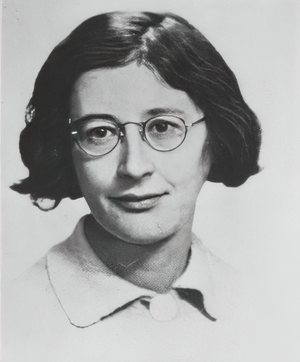
Belief in immortality is harmful because it is not in our power to conceive of the soul as really incorporeal. So this belief is in fact a belief in the prolongation of life, and it robs death of its purpose.
Share this quote:
In struggling against anguish one never produces serenity the struggle against anguish only produces new forms of anguish.
Share this quote:
To love purely is to consent to distance, it is to adore the distance between ourselves and that which we love.
Share this quote:
Friendship is not to be sought, not to be dreamed, not to be desired; it is to be exercised (it is a virtue).
Share this quote:
Men owe us what they imagine they will give us. We must forgive them this debt.
Share this quote:
Herein is a capital truth. It is not the natural capacity, the congenital gift, nor is it the effort, the will, the work, which in the intelligence as sway over the energy capable of making it fully efficacious. It is uniquely the desire, that is, the desire for beauty. This desire, given a certain degree of intensity and purity, is the same thing as genius. At all levels it is the same thing as attention. If this were understood, the whole conception of teaching would be quite other than it is. First, one would realize that the intelligence functions only in joy. Intelligence is perhaps even the only one of our faculties to which joy is indispensible. The absence of joy asphyxiates it.
Share this quote:
Affliction compels us to recognize as real what we do not think possible.
Share this quote:
Imaginary evil is romantic and varied; real evil is gloomy, monotonous, barren, boring. Imaginary good is boring; real good is always new, marvelous, intoxicating.
Share this quote:
The joy of learning is as indispensable in study as breathing is in running. Where it is lacking there are no real students, but only poor caricatures of apprentices who, at the end of their apprenticeship, will not even have a trade.
Share this quote:
Education -- whether its object be children or adults, individuals or an entire people, or even oneself -- consists in creating motives. To show what is beneficial, what is obligatory, what is good -- that is the task of education. Education concerns itself with the motives for effective action. For no action is ever carried out in the absence of motives capable of supplying the indispensable amount of energy for its execution.
Share this quote:
A beautiful woman looking at her image in the mirror may very well believe the image is herself. An ugly woman knows it is not.
Share this quote:
Love is not consolation. It is light.
Share this quote:
It is impossible to forgive whoever has done us harm if that harm has lowered us. We have to think that it has not lowered us, but has revealed our true level.
Share this quote:
God created through love and for love. God did not create anything except love itself, and the means to love. He created love in all its forms. He created beings capable of love from all possible distances. Because no other could do it, he himself went to the greatest possible distance, the infinite distance. This infinite distance between God and God, this supreme tearing apart, this agony beyond all others, this marvel of love, is the crucifixion. Nothing can be further from God than that which has been made accursed.
Share this quote:
Love of God is pure when joy and suffering inspire an equal degree of gratitude.
Share this quote:
If three steps are taken without any other motive than the desire to obey God, those three steps are miraculous; they are equally so whether they take place on dry land or on water.
Share this quote:
We are drawn towards a thing, either because there is some good we are seeking from it, or because we cannot do without it. Sometimes the two motives coincide. Often however they do not. Each is distinct and quite independent. We eat distasteful food, if we have nothing else, because we cannot do otherwise. A moderately greedy man looks out for delicacies, but he can easily do without them. If we have no air we are suffocated, we struggle to get it, not because we expect to get some advantage from it but because we need it. We go in search of sea air without being driven by any necessity, because we like it. In time it often comes about automatically that the second motive takes the place of the first. This is one of the great misfortunes of our race. A man spokes opium in order to attain to a special condition, which he thinks superior; often, as time goes on, the opium reduces him to a miserable condition which he feels to be degrading; but he is no longer able to do without it.
Share this quote:
There is something else which has the power to awaken us to the truth. It is the works of writers of genius. They give us, in the guise of fiction, something equivalent to the actual density of the real, that density which life offers us every day but which we are unable to grasp because we are amusing ourselves with lies.
Share this quote:
There is something in our soul that loathes true attention much more violently than flesh loathes fatigue. That something is much closer to evil than flesh is. That is why, every time we truly give our attention, we destroy some evil in ourselves. If one pays attention with this intention, fifteen minutes of attention is worth a lot of good works.
Share this quote:
A mind enclosed in language is in prison.
Share this quote: